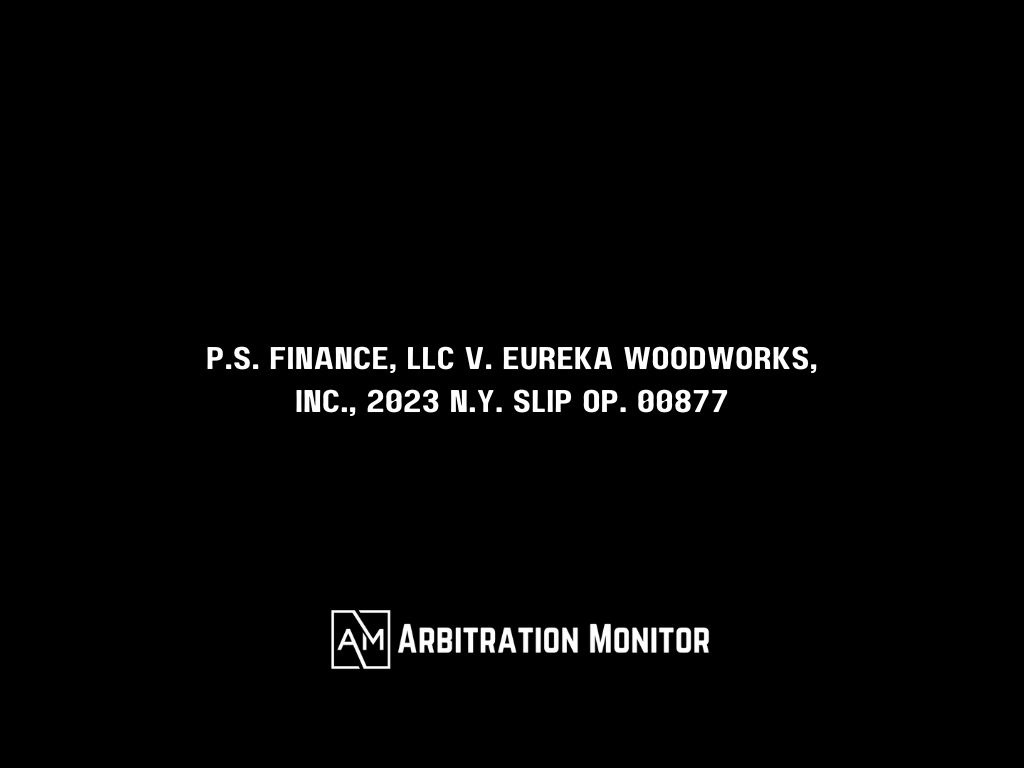Arbitration serves as a binding alternative to the traditional court system, enabling parties to resolve disputes through a neutral third party. Typically, it’s favored in business contexts and upheld by states like New York, where minimal court interference is a hallmark of the policy that acknowledges the autonomy of parties to choose arbitration. However, the dynamics take an interesting turn when parties, despite an existing agreement to arbitrate, end up in court. In such scenarios, courts may face the decision of whether to compel arbitration.
The case of P.S. Finance, LLC v. Eureka Woodworks, Inc., recently addressed by the Appellate Division, Second Department, raised pertinent questions about a court’s authority to mandate arbitration sua sponte, or on its own accord, without a request from either party. At the heart of the dispute was a financial deal connected to the effects of a major oil spill on the hotel industry and the subsequent litigation funding provided by the plaintiff to the defendant. This scenario tested the boundaries of contractually agreed arbitration provisions and court powers, sparking a discourse on the conditions under which a court may or may not enforce arbitration.
Key Insights from Legal Arbitration Precedents
- A critical determination has been made that courts lack the authority to mandate arbitration without a formal request from the involved entities.
- This decision aligns New York courts with federal judiciary precedents that refrain from initiating arbitration in the absence of party motions.
- The implications of this are significant for entities like P.S. Finance, underscoring the autonomy of parties concerning arbitration provisions.
- The principle established is that without mutual consent or a motion, the Second Department does not have the jurisdiction to compel arbitration between disputing parties.
This adherence to procedural standards ensures that the courts honor the agency of the parties involved in a legal dispute regarding the decision to arbitrate.
Annotations to Legal References
Arbitration as a Matter of Agreement
- In the realm of dispute resolution, arbitration is recognized as a contractually binding process, signifying that its legitimacy stems from the agreement between parties (Source: US Supreme Court Assertion).
Judicial Pronouncements from New York Jurisprudence
- New York courts assert that the enforcement of arbitration clauses demands adherence to contractual stipulations, thereby mandating scrutiny under general contract principles (Sources: New York Court of Appeals, Federal Court Rulings).
Applicability of Federal Arbitration Act (FAA)
- Arbitration agreements that show evidence of interstate commerce transaction involvement are subject to the Federal Arbitration Act (FAA). The U.S. Supreme Court has defined “involving commerce” under FAA to mean nearly all-encompassing involvement under Congress’ Commerce Clause power. However, in cases where it is not contended, FAA may not apply (Source: U.S. Supreme Court Interpretations).
Essential Elements of CPLR 5701(a)(2) and Appeal As of Right
- Under New York’s legislative framework, specifically the Civil Procedure Law and Rules (CPLR) 5701(a)(2), an appeal as of right may be undertaken given certain stipulated criteria. This accessibility to appeal is an integral part of New York State’s commitment to procedural fairness.
Position on Arbitration Versus Litigation
- Courts are not permitted to fabricate new rules that favor arbitration over litigation. An evenhanded approach is to be maintained so that neither mode of dispute resolution is unjustly advantaged (Source: U.S. Supreme Court Decrees).
Waiver of Right to Arbitration
- Initiating legal action typically implies a waiver of any pre-existing rights to opt for arbitration instead of litigation. Nevertheless, exceptions arise when immediate preservation of the status quo is vital and cannot wait for arbitrators to be appointed. Moreover, delays in pursuing arbitration can be construed as waiving this right, as demonstrated when defendants delay the motion to compel arbitration after the initiation of legal proceedings (Sources: New York Court of Appeals, Appellate Divisions’ Rulings).
| Waiver Criteria | New York Appellate Division Case Examples |
|---|---|
| Timely Action | Delays in moving to compel arbitration may result in waiver (Hyde v. Jewish Home Lifecare). |
| Status Quo | Urgent situations necessitating immediate action may bypass arbitration (Sherrill v. Grayco Bldrs.). |
| Action Commencement | Commencing litigation may signify arbitration waiver (De Sapio v. Kohlmeyer). |
Appealable Matters in Civil Procedure
- The avenues for appealing particular matters are often delineated by specific legislative definitions and judicial interpretations which influence the procedural dynamics within the New York State.
The content represented here is prepared for informational purposes only and is not to be construed as legal advice. Legal counsels, like those at Freiberger Haber LLP, are dedicated to providing clarity and guidance on such complex legal matters.








